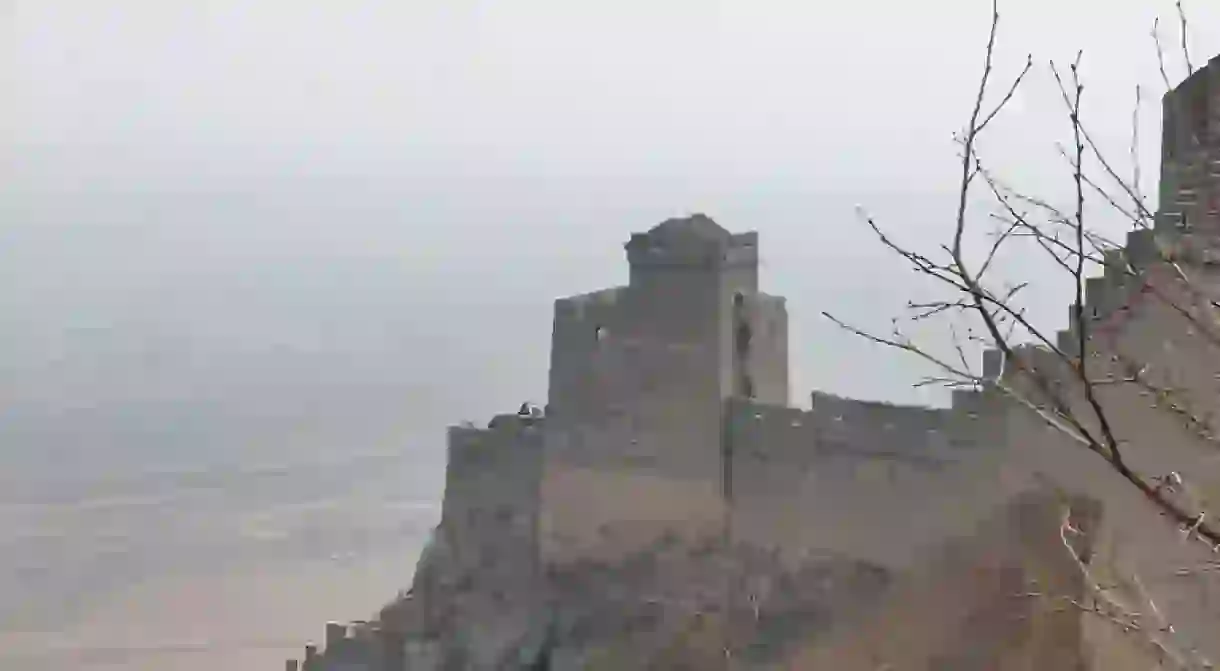A Guide to Exploring the Great Wall in Tianjin

The Great Wall at Huangya Pass (Huangyaguan Changcheng) is not for your average tourist. At times, it is as rough as it is steep, and not recommended for small children. Now that we’ve cleared that up, get your hiking face on for this astoundingly authentic section of the Great Wall of China!
Preparation
The Great Wall at Huangya Pass is a day trip in itself. It’s 93 miles or 149.6 km (a 1.5-to-2 hour drive) from downtown Tianjin, so it is best to start your journey at 7:30 am when the wall opens (so pick up breakfast and eat in the car to save time), Make sure you’re properly equipped for a real trek the night before. This includes your gear: sporting shoes, sunscreen, extra clothing (it gets quite windy), a few bottles of water, snacks, and food (there are quaint dining options below the wall). Be extra careful, this is going to be a tough climb but the views at the top are nothing short of breathtaking. And don’t worry about crowds – Huangya Pass has far fewer visitors than most Wall sites.

History
It’s not every day that you’re climbing a wartime relic constructed over 1,400 years ago…Huangya Pass was built under the North Qi Dynasty and was repeatedly damaged in countless horrendous battles but has since undergone renovations. The first rehabilitation effort was during the Ming Dynasty, the structure was reinforced with brick walls. More recently was in 1984 when major reconstruction of 1.8 miles of the wall took place, 20 watchtowers, a gatehouse, and a bridge were renovated. Finished three years later in 1987, Huangya Pass was listed as a UNESCO World Cultural Heritage site and is known nationally as the longest national renovation effort of the Great Wall.
Various landmarks
Huangya Water Gate
Connecting the East and the West, spanning 83 yards (75.8 m) and over 40 feet (12 m) high, the Water Gate has five separate arches that allow the river to flow through, this pass was one of the additional structures built during the Ming Dynasty. During ancient battles, the river archways would close and soldiers would defend from above the gate by stopping people from rowing through.
Widow Tower
The Widow Tower is a two story fortress used during wartime, primarily for housing soldiers and firing cannons. As many men lost their lives not only in battle but also during the construction of The Wall itself, the women of these fallen men gave the tower over as a gift, hence the alias “Widow”. Look out for its unique architectural artwork featuring Dragon’s head sculptures, figurines of phoenixes and crouching lions.
Taipingzhai
Pronounced “Tie Ping Jai“, this is where Qi Jiguang guards the valley surrounding the Xiaopingan Village. Who was Qi Jioguang? He’s a revered military general known as a great contributor to the region’s government in ancient times. Qi Jiguang’s statue stands in as the guard of Taipingzhai, commemorating his legacy.

Huangya Sky Ladder
For the brave, the Huangya Sky Ladder is the steepest, most challenging part of this hike, Its stairs are rough, too, so don’t relax just yet. But once you climb to the very top, you will feel instantly revived. If there’s any indicator to mark the end of this seemingly never ending climb, it’s here. Prepare for amazing views. Take your last photos, because you just completed the feat of conquering Huangyaguan Great Wall.
Fun challenges at Huangya Pass
Eight-Trigram Maze
Give your legs a rest and flex your brain muscle with this maze. The Eight-Trigram Streets or “Maze” are passing streets that zigzag one another with T-junctions. See how long it takes you to find your way out, it is more fun if you do it with others.
The Yellow Cliff Pass Great Wall Marathon
A marathon that includes 3,700 steps on the Great Wall, runners from dozens of countries, and a winning combination of ancient history, travel, sports, and Chinese culture, this internationally accredited marathon is also famed for its immersion experience with China’s peasant countryside. This marathon goes through the Wall along with neighboring fields and villages. It takes place annually on every 3rd Saturday of May. If you’re not an avid marathon runner, no fear, there is a half marathon and an eight and half kilometer race as well.

Trip tips
Ask your accommodation to help you arrange a driver. The cost would only be a few hundred (not thousand!) RMB, or take a bus from Tianjin Jinyu Passenger Station or Tianjin Tongsha Passenger Station to Jixian County. The commute will take around one and half hours and costs about 40RMB. Once you arrive, find a driver or a minibus to take you to the site. At the end of your rigorous climb, You can opt to stay in a nearby farmer’s cottage overnight but do so at your own discretion (the sleeping arrangements are not ideal to many). However their homemade cuisine is both terrific and cheap, and can be a perfect last stop. The Great Wall at Huagya Pass is open from 7:30-6:30 pm and costs 50 RMB to enter.













